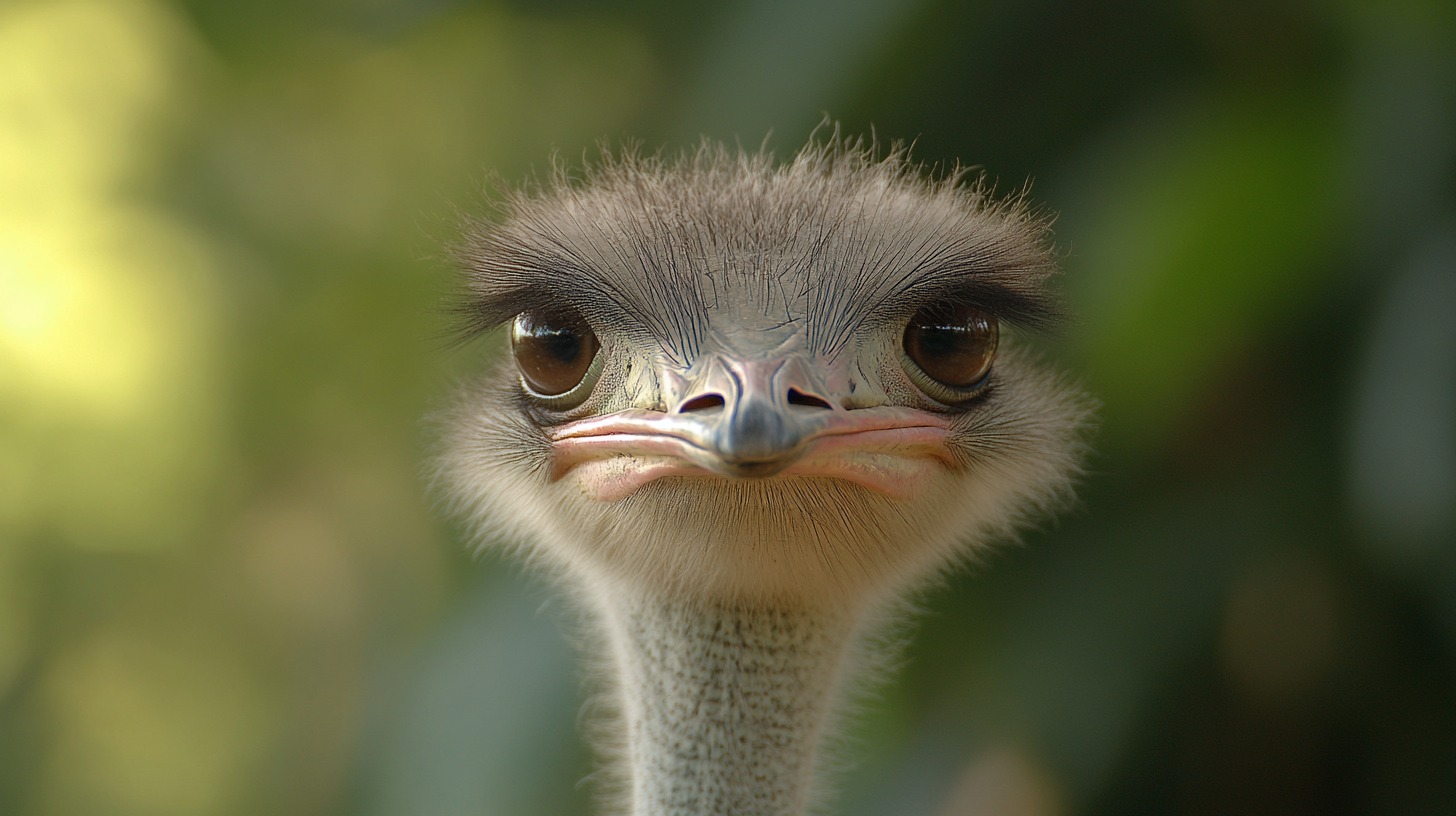
Share Post:
The diversity of the avian world is truly remarkable, with species that range from tiny hummingbirds to the towering ostrich.
Among them, the largest birds stand out due to their impressive size and unique adaptations.
These giant birds have evolved to thrive in various environments, with size playing a key role in their survival strategies, whether for dominating the skies, defending against predators, or efficiently utilizing resources.
Size influences everything from flight capability to ecological balance, making large birds an essential part of their respective ecosystems.
With that in mind, let us provide you with a list of top 30 biggest living birds in the world.
Table of Contents
Toggle30. Great Frigatebird (Fregata minor)
The Great Frigatebird is known for its extraordinary wingspan, which allows it to soar for days over tropical oceans.
These birds are remarkable for their aerial agility and light body, which makes long-distance flights easier.
Despite their size, they are not strong swimmers and rely on their long wings to snatch prey from the ocean’s surface.
- Weight: Up to 3.3 pounds (1.5 kg)
- Region of Origin: Tropical oceans
29. Northern Bald Ibis (Geronticus eremita)

The Northern Bald Ibis is an endangered bird species found in North Africa and the Middle East. It is easily recognizable by its bald head and glossy black plumage.
These birds are known for their social nature and migratory habits. Unfortunately, habitat loss and human interference have drastically reduced their numbers.
- Weight: Up to 4.9 pounds (2.2 kg)
- Region of Origin: North Africa and the Middle East
28. Secretarybird (Sagittarius serpentarius)

Native to Africa, the Secretarybird is a unique terrestrial bird of prey with long legs and a striking appearance.
Its height allows it to spot and chase down its prey, which mainly consists of snakes and other small animals.
Its impressive height also aids in survival in open grasslands.
- Weight: Up to 7.3 pounds (3.3 kg)
- Region of Origin: Africa
27. Black Vulture (Coragyps atratus)
Black Vultures are scavengers that can be found throughout North and South America. They are smaller than many other vultures but are known for their adaptability to various environments.
Their wingspan allows them to glide effortlessly in search of carrion, playing a key role in ecosystem health by cleaning up decaying matter.
- Weight: Up to 6 pounds (2.7 kg)
- Region of Origin: North and South America
26. Great White Pelican (Pelecanus onocrotalus)
The Great White Pelican is one of the largest flying birds, recognized by its massive wingspan and distinctive white plumage.
They are known for their cooperative feeding strategies, where groups of pelicans work together to corral fish into shallow waters before scooping them up in their large beaks.
- Weight: Up to 33 pounds (15 kg)
- Region of Origin: Africa and Europe
25. Northern Gannet (Morus bassanus)

Found in the North Atlantic, Northern Gannets are renowned for their spectacular plunge-diving abilities.
These birds dive from great heights to catch fish, entering the water with incredible speed and precision.
Their streamlined bodies and strong wings are perfect for navigating both air and water.
- Weight: Up to 7 pounds (3 kg)
- Region of Origin: North Atlantic
24. Greater Flamingo (Phoenicopterus roseus)

Known for their vibrant pink color, Greater Flamingos are commonly found in wetlands across Africa, Europe, and Asia.
They are filter feeders, using their specialized beaks to extract small organisms from the water. Their unique coloration is derived from the carotenoid pigments found in their diet.
- Weight: Up to 7.7 pounds (3.5 kg)
- Region of Origin: Africa, Europe, and Asia
23. Great Hornbill (Buceros bicornis)
The Great Hornbill is a large, striking bird with a massive beak, native to Southeast Asia. These birds are frugivores, mainly consuming fruit, but they are also known to hunt small animals.
Their size and colorful casque make them a significant species in the ecosystems they inhabit.
- Weight: Up to 13 pounds (6 kg)
- Region of Origin: Southeast Asia
22. Cinereous Vulture (Aegypius monachus)
The Cinereous Vulture is one of the largest birds of prey, with a considerable wingspan and a powerful build.
These scavengers are found across Europe and Asia and play a crucial role in maintaining ecosystem health by feeding on carrion. Their size makes them formidable competitors for food.
- Weight: Up to 31 pounds (14 kg)
- Region of Origin: Europe and Asia
21. Domestic Turkey (Meleagris gallopavo f. domesticus)

The domestic turkey, bred primarily for food, is among the heaviest birds, particularly the male.
Domesticated turkeys have been bred to grow larger than their wild counterparts, and they are commonly associated with North America. Their size has been selected for agricultural purposes, prioritizing meat production over flight.
- Weight: Up to 50 pounds (23 kg)
- Region of Origin: North America
20. Kori Bustard (Ardeotis kori)
The Kori Bustard is a large terrestrial bird native to Africa, and it holds the title of the heaviest bird capable of flight.
While its size may seem limiting, the Kori Bustard is well-adapted to its environment and can take flight when necessary. It primarily feeds on small animals and plants.
- Weight: Up to 44 pounds (20 kg)
- Region of Origin: Africa
19. Great Bustard (Otis tarda)
Native to Europe and Asia, the Great Bustard is another one of the heaviest birds capable of flight.
These birds are ground-dwellers that use their large wings to soar above grasslands. Great bustards have quite interesting mating displays, where males inflate their throats to attract females.
- Weight: Up to 31 pounds (14 kg)
- Region of Origin: Europe and Asia
18. King Penguin (Aptenodytes patagonicus)

The King Penguin is the second-largest penguin species and is well-adapted to the cold Southern Ocean.
These penguins can dive deep into the ocean to hunt fish and squid. Their size helps them conserve body heat and survive in harsh climates.
- Weight: Up to 40 pounds (18 kg)
- Region of Origin: Southern Ocean
17. Emperor Penguin (Aptenodytes forsteri)

The Emperor Penguin is the largest of all penguin species and is native to Antarctica. These penguins are famous for their endurance, braving extreme cold to raise their young.
They huddle together for warmth during the long Antarctic winter.
- Weight: Up to 88 pounds (40 kg)
- Region of Origin: Antarctica
16. Cinereous Vulture (Aegypius monachus)
The Cinereous Vulture is a massive bird of prey found in Europe and Asia.
As scavengers, they help maintain a healthy environment by feeding on carrion. Their size and strength enable them to dominate other scavengers when food is scarce.
- Weight: Up to 31 pounds (14 kg)
- Region of Origin: Europe and Asia
15. Trumpeter Swan (Cygnus buccinator)
The Trumpeter Swan is the largest swan species, native to North America.
Known for their loud, trumpet-like calls, these birds are majestic creatures, often found in lakes and ponds. Their large size aids in long flights during migration, and they are a key species in wetland ecosystems.
- Weight: Up to 35 pounds (16 kg)
- Region of Origin: North America
14. Mute Swan (Cygnus olor)

The Mute Swan is native to Europe and Asia and is known for its graceful appearance.
Unlike the Trumpeter Swan, it is mostly silent, hence its name. These swans are territorial and can be quite aggressive during the breeding season. Their size and beauty make them a common symbol in art and literature.
- Weight: Up to 30 pounds (14 kg)
- Region of Origin: Europe and Asia
13. Marabou Stork (Leptoptilos crumenifer)

The Marabou Stork is a scavenger that often lives in Africa, often seen near human settlements or scavenging at landfills.
Despite their somewhat unattractive appearance, these birds play an essential role in the ecosystem by consuming carrion and waste. They have an enormous wingspan.
- Weight: Up to 20 pounds (9 kg)
- Region of Origin: Africa
12. Harpy Eagle (Harpia harpyja)

The Harpy Eagle, native to South American rainforests, is one of the largest and most powerful eagles in the world.
These eagles hunt mammals such as monkeys and sloths, using their incredible strength and sharp talons. Their large wings are adapted for navigating through dense forests.
- Weight: Up to 20 pounds (9 kg)
- Region of Origin: South America
11. Andean Condor (Vultur gryphus)

The Andean Condor is the largest raptor and you can see it soaring high above the mountains of South America.
With a massive wingspan, this bird uses thermal currents to glide effortlessly in search of carrion. Its size makes it a dominant force in the skies.
- Weight: Up to 33 pounds (15 kg)
- Region of Origin: South America
10. Shoebill (Balaeniceps rex)

The Shoebill is a prehistoric-looking bird with an enormous beak, found in the wetlands of Africa.
Its massive beak is perfectly suited for catching large fish, including lungfish and eels. Despite its size, the Shoebill remains remarkably still when hunting, using stealth to its advantage.
- Weight: Up to 15 pounds (7 kg)
- Region of Origin: African wetlands
9. Wandering Albatross (Diomedea exulans)
The Wandering Albatross has the longest wingspan of any living bird, allowing it to cover vast distances across the Southern Ocean.
These birds can remain airborne for days, using air currents to glide with minimal energy. Their size and endurance make them highly adapted to life at sea.
- Weight: Up to 24 pounds (11 kg)
- Region of Origin: Southern Ocean
8. Dalmatian Pelican (Pelecanus crispus)
The Dalmatian Pelican is the largest flying bird by weight, found in Europe and Asia. These pelicans are known for their graceful flight and fishing abilities, using their massive beaks to scoop up fish from lakes and rivers.
Their size and striking appearance make them one of the most impressive birds in their habitat.
- Weight: Up to 33 pounds (15 kg)
- Region of Origin: Europe and Asia
7. Lesser Rhea (Rhea pennata)

The Lesser Rhea is slightly smaller than the Greater Rhea, but it is still a large, flightless bird native to South America.
These birds are well-adapted to life in open grasslands and are known for their speed and agility on the ground. They primarily feed on plants and small animals.
- Weight: Up to 63 pounds (28.6 kg)
- Region of Origin: South America
6. Greater Rhea (Rhea Americana)

The Greater Rhea is a flightless bird native in South America. Known for their tall stature and strong legs, these birds are excellent runners, using their speed to escape predators.
They are the largest birds in South America and have a varied diet that includes plants and small animals.
- Weight: Up to 88 pounds (40 kg)
- Region of Origin: South America
5. Northern Cassowary (Casuarius unappendiculatus)
The Northern Cassowary is a large, flightless bird found in New Guinea. It is known for the distinctive casque on its head, which helps it navigate dense forests.
Despite its size, the cassowary is an elusive bird, but when provoked, it can be dangerous due to its powerful legs and sharp claws.
- Weight: Up to 165 pounds (75 kg)
- Region of Origin: New Guinea
4. Southern Cassowary (Casuarius casuarius)
The Southern Cassowary is another large flightless bird, native to Australia and New Guinea. It is closely related to the Northern Cassowary and is equally formidable.
These are shy but can become aggressive if threatened, and their powerful kicks can cause serious injury.
- Weight: Up to 167 pounds (76 kg)
- Region of Origin: Australia and New Guinea
3. Emu (Dromaius novaehollandiae)

The Emu is Australia’s largest bird and the second-largest bird in the world by height.
Emu is a flightless bird, well-known for its incredible running ability, capable of reaching high speeds to evade predators.
- Weight: Up to 121 pounds (55 kg)
- Region of Origin: Australia
2. Somali Ostrich (Struthio molybdophanes)
The Somali Ostrich is slightly smaller than the Common Ostrich but still one of the largest birds on Earth.
This bird, native to East Africa, stands out for its striking blue neck and legs.
Like other ostriches, it is a flightless bird with remarkable speed and strength, making it well-suited to life on the savanna.
- Weight: Up to 344 pounds (156 kg)
- Region of Origin: East Africa
1. Common Ostrich (Struthio camelus)

The Common Ostrich is the largest living bird, native to the plains of Africa. Known for their incredible running speed, these birds can cover great distances to escape predators.
They are flightless but possess strong legs that allow them to defend themselves with powerful kicks.
- Weight: Up to 287 pounds (130 kg)
- Region of Origin: Africa
Summary
The diversity of large birds highlights the remarkable adaptations that have allowed these species to thrive in various ecosystems.
From the flightless ostrich to the soaring albatross, each bird represents an evolutionary path.
Protecting these majestic creatures and their habitats is vital for maintaining the ecological balance and ensuring their survival for generations to come.
Related Posts:
- Top 10 Largest Cat Breeds in the World - Feline World Giants
- 10 Largest Snakes in the World - Facts and Figures
- Top 10 Migratory Birds in The World You Need to Know About
- Top 15 Highest Flying Birds In The World
- Top 10 Birds With Blue Wings You Can Spot in the Wild
- 20 Stunningly Large White Birds (Photos, Facts, And Sizes!)











